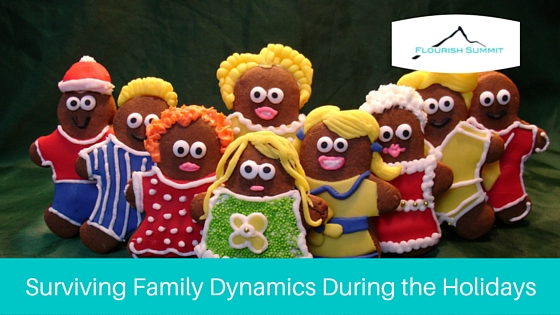The holidays are supposed to be a time of joy, spending time with family and friends. But for many people, this time of year represents the most stressful period of the year due to the lack of understanding of family dynamics.
The access point for identifying our childhood survival strategies is through studying our personal history. Often, by stepping back and viewing the past, we can clearly see the defense mechanisms we chose to be safe. We can also view the histories of family members to see these strategies. Families form an overall dynamic as a unit. The players fit like an intricate puzzle, feeding each other and feeding off one another. Often your own patterns are reflected in other members of your family. For example, if your sister exploded with blame and criticism when confronted with a disappointment, is it possible you do the same? Or is it possible that you learned to do the opposite in order to play your part in the family dynamic?
Our personality types determine in part how we process the world, and most human beings assume – incorrectly – that others are processing the world exactly as they process it. Sometimes, parents and children have same or similar personality types, which makes the relationship run more smoothly – at least until the natural rebellion of puberty kicks in! People with the same type naturally understand each other’s desires and motivations. They know how to communicate and interact with one another to be understood and accepted. They approach problem solving and express emotions similarly. Basically, they speak the same language.
But in looking around the holiday table at the members of most families, it’s almost like a session of the United Nations where everyone speaks a different language and needs a translator! It’s pretty clear that children are often different types than their parents. Some parents respect this and do their best to translate into their children’s language. But parents who are unaware of how different types operate or who subscribe to the “blank slate” theory, often wrongly assume that their child is (or should be) their same personality type and that child does (or should) process the world as they do and does (or should) speak the same language. This doesn’t work out well because personality is inherent.
The key to surviving family get-togethers is to be flexible. Flexibility is having the ability to respond consciously rather than react unconsciously. The degree of flexibility we experience as adults is in direct proportion to how well we have identified and dismantled our unconscious childhood survival strategies. The point of the journey is to become who we really are and express that fully in the world. Our ability to be flexible in each area of life tells us how close we are to that goal.
Functional or dysfunctional, awake or asleep, happy and harmonious or full of painful conflict, our time within the family unit as children provides a myriad of opportunities to learn and grow, to define who we really are.
